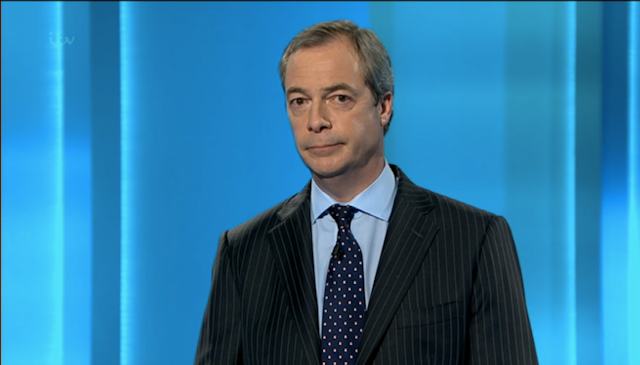Nigel Farage has used his appearance in a seven-way party leaders debate to confirm his status as both the most unashamedly populist and polarising figure in UK politics.
Repeatedly painting himself as the insurgent candidate among the Westminster elite, Farage made some notably animated interventions in an otherwise largely sterile two-hour broadcast. He called on the other leaders to “get real” on the economy and urged them to tell the truth on EU immigration.
His most memorable intervention though, was surely his incendiary comment about how much it costs the NHS to treat foreign patients with HIV. This prompted a visceral reaction from the other leaders, with Plaid Cymru’s Leanne Wood telling him he should be ashamed of himself.
Neither David Cameron nor Ed Miliband chose to confront the UKIP leader in any substantive way on this most contentious issue. They stood back and let Wood chide Farage on their behalf.
And yet, one can’t help feeling Farage knew what he was doing. This was not the first time he has quoted figures on HIV patients. By picking a subject which was so emotive he could be sure to get press coverage – which has been lacking in the first week of the campaign. He was also aiming for a positive reception from his target audience – disaffected voters who see UKIP as a party that “tells the truth”.
Changing the record
While UKIP policies are often characterised as narrowly focused, playing on fears of immigration and dislike of the EU, Farage developed a broader narrative as the evening went on. The call for the return of grammar schools is a particularly salient issue in Kent, where Farage hopes to win a parliamentary seat.
Meanwhile, there was also evidence of a broader and longer-term strategy beyond England. Farage called for a revision of the Barnett formula so that Wales gets more public funding.
This is an increasingly important issue in Welsh politics and while UKIP may not win any seats in Wales in 2015, it is on course to secure its first representation in next year’s Welsh Assembly elections.
Focus on local issues
But there were failures for Farage too. The strict format and studio layout meant he was unable to land a telling blow on Cameron – which must have been a key objective.
In fact, despite some debate with Clegg, Farage found himself largely frozen out by the three main party leaders. In polling conducted immediately after the debate, he was rated as both the worst and best performer on the night.
This might actually be good for UKIP though. In the wider context of the election campaign Farage may be fortunate that while it appears he performed well enough to sustain the party’s position in the polls, he did not emerge as a clear winner.
Many Liberal Democrat strategists blame Nick Clegg’s success in the first leaders’ debate in 2010 for a change in tactics that ultimately cost the party seats.
UKIP is projected to win between one and four seats on May 7. In order to achieve this, or better, the party will need to focus its energy on local campaigning and not be distracted by national political events.

